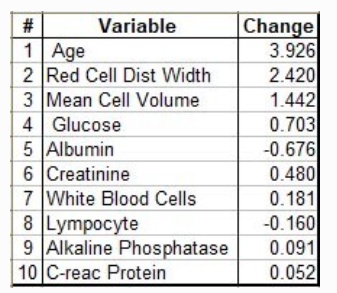Vlasko
#2
The Smurfs eat alkaline phosphatase biscuits:
3 Likes
How is this increased? My brief searches just found zinc supplementation.
And this:
1 Like
Thank you  Very much appreciated
Very much appreciated 
Neo
#7
Looks like we can test it - from your link above
Get a standard blood test. Your doctor will have to order this blood test for you. This will test for ALP, along with a number of other enzymes that help indicate your overall level of health. If you have concerns regarding your ALP levels due to malnutrition or a pre-existing condition, ask your doctor about getting a standard blood test.[2]
1 Like
Bicep
#10
Intestinal alkaline Phosphatase is increased by butyrate or vitamin K1 (~1500mcg/day). Butyrate comes from great prebiotics like inulin or dandilion or chikory root. Also acarbose and alpha cyclodextrin. Thats Intestinal AP, in the blood stream AP follows the level of LPS and more is not better. You want low numbers here.
7 Likes
LukeMV
#11
Wow the timing of this thread couldn’t have come at a better time.
I’ve been struggling with low Alkaline Phosphatase for years. Blood tests show a level between 40-50 depending on the day I get it checked. Technically, 40 is the bottom of the range but clearly I want it higher.
Is this a supplement or drug I can access online or is it some new thing that will be impossible for me to get?
2 Likes
Lost
#12
Ingested ALPI won’t cross the into the blood in significant quantities – it’s also a slightly different protein than you’re talking about. Injecting human proteins is a whole different – and expensive – ball game.
1 Like
Bicep
#13
You want low ALP. 50 is perfect, it’s what mine was when I was 50. Now mine is more like 85. The older you get the higher it goes. Low ALP indicates low LPS, or a low microbial burden. You’re doing great.
I should be looking for supplemental IAP, not you.
7 Likes
Vlasko
#14
If you’d like more information you could have a fractionated test done through Labcorp or Quest Diagnostics.
This test shows “relative percentages of liver, bone, and intestinal alkaline phosphatase isoenzymes and total alkaline phosphatase.”
Marek Diagnostics offers the test for $25:
1 Like
Your ALP is in the lower normal range. Can you cite any RCT study that indicates that you should worry if your ALP is in the normal range?
“Even though researchers know the function of several other types of enzymes and have studied alkaline phosphatase for decades, they don’t yet know the exact function of ALP.”
“High levels of ALP may indicate liver disease or certain bone disorders, but an ALP test alone cannot diagnose a condition.”
Bicep
#16
I’m going by Michael Lustgarten’s book on the microbial burden. Also the biomarker optimizer graphs:
https://biomarkeroptimizers.com/tools/test-results-analyzer/
Lustgarten says when serum ALP is more than 48 it increases your all cause mortality. He shows a graph that looks a lot like the one in biomarker optimizer. The higher the worse.
Intestinal ALP decreases with age, letting more LPS through the gut into the serum. As serum LPS increases, the body increases serum ALP to take care of it. ALP gets rid of LPS.
2 Likes
I don’t think Michael Lustgarten puts too much weight on any particular test, and the majority of the information is about observational studies, not RCTs. BTW can you point to his video about ALT?
The graph you point to is based on an observational study only.
“Age and sex variation in serum albumin concentration: an observational study”
Bicep
#18
Sorry, I think I saw that here too not that long ago but can’t find it now.
I don’t know for sure but I like that he sticks his neck out a bit and tells the reader what he thinks based on observational studies. I learned a great deal from his book and even if it’s wrong at least I know the characters a little better. LPS, ALP, CD38,NAD, LL-37. That article you pointed to said they don’t know what it does. He says if you work on barrier function and reduce microbial burden it will go down. Anything over 48 is bad. So at least I have an idea what to do.
It’s fine to want to adjust all of our health parameters to the best possible levels, but ALT is not high on my list.
As you can see ALT isn’t even on the Levine-based age spreadsheet calculator.
Also, ALT is not found as one of the parameters on the Aging.Ai, 19 parameter input calculator.
(As, a side note: Why I am not big on CRP measurements unless you are sick and it is being used to help with a diagnosis) “C-reactive protein value can change by orders of magnitude in the presence of a wound or infection.”
FWIW, (Maybe, posted before?):
Ranking the influences in order as calculated by @JGC Retired Professor of Physics 4 yrs ago.

2 Likes
Bicep
#20
ALT is alanine transaminase, not to be confused with ALP alkyline phosphatase. Alkyline Phosphatase is in the levine calculator. And I don’t really understand the list you put out but it looks like it’s worth more than CRP.
I’ve been talking about ALP.
1 Like